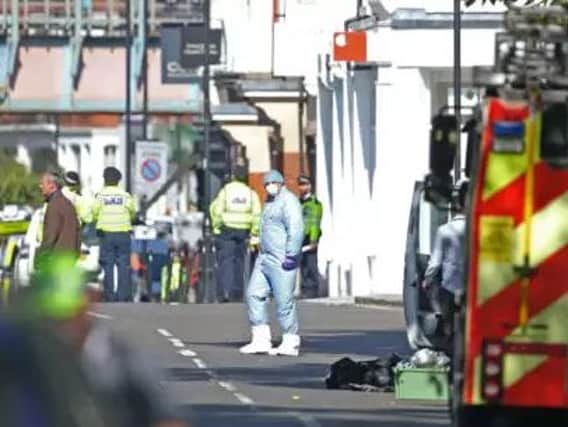Russian state media telling "bare-faced lies", MI5 chief says


It comes a day after the widow of Alexander Litvinenko, another Kremlin critic killed with radioactive poison in London, called on Alex Salmond to abandon his programme for government-funded broadcaster Russia Today (RT).
In an blistering critique, Director General of the Security Service Andrew Parker accused the Kremlin of attempting to mislead the world through "bare-faced lies", social media disinformation and ridicule of critics.
Advertisement
Hide AdAdvertisement
Hide AdRussian-state media outlets and representatives promoted at least 30 "explanations" for the Salisbury nerve agent attack as part of a campaign to shift blame for the attempted assassination, the head of MI5 has said.
Vladimir Putin's regime has been the subject of international condemnation since the attack on former double agent Sergei Skripal in March, which saw the first use of a nerve agent in Europe since the Second World War.
The British Government has pointed the finger at Russia but Moscow has repeatedly denied responsibility. Following the attack, Mr Salmond has come under sustained pressure from political opponents and some SNP colleagues to stop producing his programme for RT.
The channel is under investigation by broadcast regulator Ofcom over allegations that it breached impartiality rules in the wake of the Salisbury attack, although none of the incidents relates to the Alex Salmond Show.
Mr Salmond says his programme is independently produced and has the freedom to be critical of the Russian government.
Giving the first public speech outside the UK by a serving head of MI5, Mr Parker told an audience of security chiefs in Berlin that Europe faces "age old attempts at covert influence and propaganda have been super charged in online disinformation, which can be churned out at massive scale and pace, and at little cost.
"The aim is to sow doubt by flat denials of the truth, to dilute truth with falsehood, divert attention to fake stories, and do all they can to divide alliances.
"Bare-faced lying seems to be the default mode, coupled with ridicule of critics."
Advertisement
Hide AdAdvertisement
Hide AdMr Parker said the Russian state has developed a "well-practiced doctrine" of blending media manipulation, social media disinformation and distortion, along with new and old forms of espionage, high levels of cyber attacks, military force and "criminal thuggery".
The Salisbury attack was "swiftly followed by a cynical and distasteful information campaign to sow confusion and doubt", he told the conference.
"The Russian state's media outlets and representatives have propagated at least 30 different so-called explanations in their efforts to mislead the world and their own people."
Mr Parker referenced a media survey which found that two-thirds of social media output at the peak of the Salisbury crisis came from accounts controlled by the Russian government.
He did not single out specific sources but the Russian embassy in the UK has repeatedly issued statements and tweets disputing Britain's allegations about the attack.
The embassy has accused the British government of destroying evidence and denying access to the investigation, while describing findings that the Novichok chemical had originated in Russia as a "myth".
A large-scale investigation to identify the would-be assassin or assassins is ongoing. Mr Skripal remains in hospital, while his daughter Yulia, who was also taken ill, was released to a secure location last month.
Mr Parker condemned the "reckless" attack, saying it put "numerous" lives at risk. Mr Skripal, 66, and his daughter, 33, had only been saved thanks to "near miraculous" medical treatment, he added.
